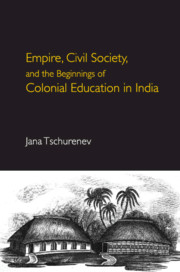Book contents
- Frontmatter
- Dedication
- Contents
- List of Figures
- List of Tables
- List of Abbreviations
- Acknowledgements
- Introduction: Empire Civil Society, and Educational Transformation in India
- 1 A Colonial Experiment in Education, Madras, 1789–1796
- 2 Education of the Poor, 1805–1813
- 3 Missionaries, Empire, and the Cause of Universal Education, 1792–1824
- 4 Race, Class, and Gender: The Social Agenda of Education, 1809–1830
- 5 Rules and Numbers: Transforming Rural Education, 1814–1830
- 6 Intellectual Conquest: Education Societies, ‘Useful Knowledge’, and the Bengal Renaissance, 1817–1854
- 7 Civil Society, Government, and Educational Institution-Building, Bombay Presidency, 1819–1882
- 8 Teaching the Marginalized: Universal Education and the Politics of Inequality, 1789–1937
- Conclusion: The Emergence of Public Elementary Schooling in an Imperial Frame
- Bibliography
- Index
1 - A Colonial Experiment in Education, Madras, 1789–1796
Published online by Cambridge University Press: 26 April 2019
- Frontmatter
- Dedication
- Contents
- List of Figures
- List of Tables
- List of Abbreviations
- Acknowledgements
- Introduction: Empire Civil Society, and Educational Transformation in India
- 1 A Colonial Experiment in Education, Madras, 1789–1796
- 2 Education of the Poor, 1805–1813
- 3 Missionaries, Empire, and the Cause of Universal Education, 1792–1824
- 4 Race, Class, and Gender: The Social Agenda of Education, 1809–1830
- 5 Rules and Numbers: Transforming Rural Education, 1814–1830
- 6 Intellectual Conquest: Education Societies, ‘Useful Knowledge’, and the Bengal Renaissance, 1817–1854
- 7 Civil Society, Government, and Educational Institution-Building, Bombay Presidency, 1819–1882
- 8 Teaching the Marginalized: Universal Education and the Politics of Inequality, 1789–1937
- Conclusion: The Emergence of Public Elementary Schooling in an Imperial Frame
- Bibliography
- Index
Summary
England's debt to India in pedagogics has been fitly acknowledged in the tablet in Westminster Abbey, which describes Andrew Bell as ‘the eminent founder of the Madras System of Education, which has been adopted within the British empire, as the national system of education for the children of the poor’.
The Indian Origins of the Monitorial System
One of the most interesting features of the monitorial system of education is that it did not originate in England, but in a colonial setting. An abandoned military fort near the port city of Madras was the scene of an experiment that inspired the formulation of the globally circulating model. Egmore Redoubt, as this place was called, accommodated an asylum for the sons of European officers and soldiers which also provided some basic literacy instruction. In 1789, while his home country was shaken by European political turmoil, the Scottish adventurer, science lecturer, and ordained pastor of the Anglican Church Andrew Bell (1753–1832) was appointed to superintend the education of these children. During his tenure, he completely remodelled the asylum school and transformed it – against the resistance of his teachers – from an old-fashioned charity into a modern, rational, and effective disciplinary institution.
This place of origin – the colonial city of Madras – has attracted the attention of colonial policymakers and scholars alike. British officials, who were concerned with the expansion and reform of popular instruction in India, were the first to comment on the ‘Indianness’ of the monitorial system. In its educational despatch of 1814, the Court of Directors of the East India Company expressed the opinion that Bell's new mode of education was, basically, the ‘mode of instruction that from time immemorial has been practiced’ under Indian village schoolmasters, concluding that it must, therefore, be well adapted for the spread of modern knowledge throughout the country. This notion of ‘improving’ the institutions of the Indians and ‘returning’ them afterwards occurs regularly in the discourse of the civilizing mission that emerged in the beginning of the nineteenth century. In the controversy of whether the Anglican Bell or his Quaker competitor Joseph Lancaster (1778–1838) had the better claims for authorship of the monitorial system, British educationalists referred to the ‘Indian origins’ to downplay Bell's role as an innovator.
- Type
- Chapter
- Information
- Publisher: Cambridge University PressPrint publication year: 2019



